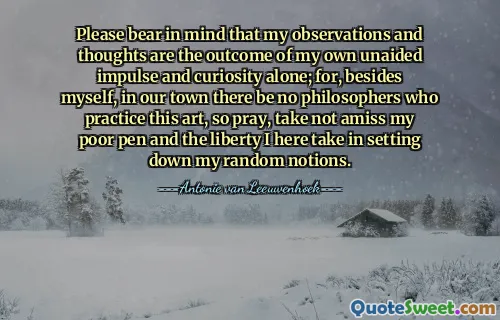📖 Antonie van Leeuwenhoek
| 👨💼 Wissenschaftler
Antonie van Leeuwenhoek, a Dutch cloth merchant and scientist, is often referred to as the father of microbiology. In the late 17th century, he made groundbreaking contributions to the field of microscopy. Using handcrafted microscopes, he was the first person to observe and describe single-celled organisms, which he called "animalcules." His meticulous observations of bacteria, protozoa, and other microscopic life forms laid the foundation for the study of microbiology and opened up new avenues for scientific exploration. Leeuwenhoek's approach combined keen observation with detailed documentation. He meticulously recorded his findings in letters to the Royal Society of London, which helped disseminate his discoveries to the scientific community. His work demonstrated the existence of microscopic life, changing the perception of life on Earth and challenging existing scientific assumptions. Despite working in relative isolation and without formal scientific training, his innovative spirit and dedication fostered a deeper understanding of biology. Overall, Antonie van Leeuwenhoek's curiosity and persistence significantly influenced science. His discoveries not only expanded knowledge about microorganisms but also inspired future generations of scientists to explore the microscopic world. He remains a pivotal figure in biology, recognized for his pioneering techniques and exemplary observational skills that transformed scientific inquiry.
Antonie van Leeuwenhoek was a Dutch scientist and pioneering microscopist known for his groundbreaking work in microbiology.
He is famous for being the first to observe single-celled organisms through his handcrafted microscopes, calling them 'animalcules.'
His detailed documentation of his observations contributed immensely to the scientific community's understanding of microscopic life, establishing him as a foundational figure in the field.
Mehr anzeigen »
Today Birthdays
1866 -
Gilbert Murray
1959 -
Patrick Nielsen Hayden
1956 -
Lynda Barry
1920 -
Isaac Asimov
1928 -
Daisaku Ikeda
1938 -
Robert Smithson
1967 -
James Marshall
1938 -
David Bailey
1936 -
Roger Miller
1909 -
Barry Goldwater
1983 -
Kate Bosworth
1962 -
April Winchell
1940 -
Jim Bakker
1963 -
Matthew Stewart
1942 -
Dennis Hastert
1905 -
Michael Tippett
1970 -
Eric Whitacre
1947 -
Jack Hanna
1858 -
Beatrice Webb
1972 -
Taye Diggs
1963 -
David Cone
1991 -
Ben Hardy
1913 -
Anna Lee
